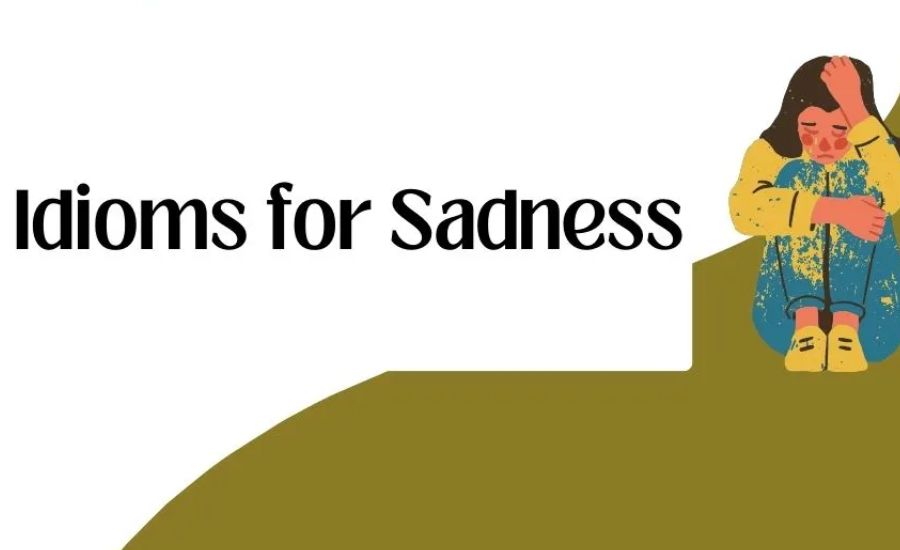Sadness is a herbal and time-honored emotion—something that touches all people at special factors in existence. Whether it stems from non-public loss, sadness, or introspective moments, this sense is deeply rooted in the human experience. However, placing that emotion into phrases isn’t continually easy. Sometimes, normal language just doesn’t capture the depth of what we’re feeling. That’s wherein idioms come in.
Idioms related to disappointment provide more than simply colorful language—they help us specific emotional states in a brilliant, relatable way. These expressions permit us to proportion our internal international via imagery and metaphor, constructing emotional bridges with others. When someone says they’re “feeling blue” or “inside the dumps,” there’s no want for a prolonged explanation. The imagery speaks for itself, evoking an on the spot experience of empathy and knowledge.
These terms are not simply decorative—they serve a effective reason. They connect us. They assist us percentage tough feelings in methods that others can immediately apprehend. In many methods, idioms make our language extra human.
In this text, we’ll delve into some of the maximum extensively used idioms that deliver disappointment. We’ll find the memories and meanings behind them, explore why they resonate so strongly, and reflect on how they help us hook up with others. By understanding these expressions, we now not only improve our language however additionally end up better ready to communicate our emotions—and to support others via theirs—with authenticity and compassion.
1. Feeling Blue
Definition: Experiencing a length of unhappiness or mild emotional distress.
Example: Since her cherished puppy disappeared, Jenna has been feeling blue every day.
Similar Expressions: Feeling down, emotionally drained.
Contextual Insight: This phrase is commonly used in informal verbal exchange to describe emotional fatigue or diffused sorrow that doesn’t necessarily have a specific trigger.
2. Down within the Dumps
Definition: Struggling with a significant emotional stoop, frequently linked to recent disappointment.
Example: After the interview didn’t cross as deliberate, Aaron located himself down inside the dumps.
Similar Expressions: Feeling gloomy, emotionally flat.
Added Value: This idiom paints a shiny photo of being emotionally buried or stuck, much like being in a bodily ditch—making it a relatable metaphor.
3. Crying Over Spilled Milk
Definition: Wasting emotional power on past errors or activities that can’t be undone.
Example: Yes, the possibility was neglected, however there’s no use crying over spilled milk now.
Similar Expressions: Regretting the beyond, caught in hindsight.
Pro Tip: Often used as recommendation, this phrase encourages human beings to consciousness on what may be modified in preference to what’s already misplaced.
4. Carrying a Heavy Heart
Definition: Experiencing deep sorrow or emotional weight, often following distressing news.

Example: After mastering approximately the tragedy lower back home, she walked round with a heavy coronary heart.
Similar Expressions: Overcome with grief, confused via sadness.
Emotional Layer: This phrase captures the feeling of inner heaviness that grief or disappointment often brings.
5. Wearing Your Heart on Your Sleeve
Definition: Expressing your feelings brazenly, making your vulnerability visible to others.
Example: You should tell how a lot the news affected James—he always wears his heart on his sleeve.
Similar Expressions: Emotionally transparent, now not hiding feelings.
Expert Insight: While this openness can foster connection, it could additionally depart someone emotionally uncovered.
6. Feeling Downhearted
Definition: Experiencing discouragement or low spirits, generally after a setback.
Example: The group’s loss within the finals left each person feeling downhearted.
Similar Expressions: Crestfallen, discouraged.
Contextual Clarity: Often used when hopes or expectations are crushed, especially in competitive or personal achievement settings.
See Also 20 Idioms For Beautiful Girl
7. Having the Blues
Definition: Sinking right into a prolonged state of emotional disappointment, regularly without a clear purpose.
Example: As the iciness months rolled in, Mia observed herself having the blues again.
Similar Expressions: Melancholic, quietly unhappy.
Cultural Note: This idiom is extensively utilized in song, particularly in blues genres, which have been born from emotional expression.
8. Heartbroken
Definition: Being emotionally devastated, commonly from a romantic breakup or widespread loss.
Example: After their five-yr relationship ended, Leo changed into completely heartbroken.
Similar Expressions: Emotionally shattered, grief-troubled.
Depth of Feeling: This time period implies intense emotional ache that often lingers longer than anticipated.
9. Tearjerker
Definition: A tale, movie, or tune that evokes deep emotions and often ends in tears.
Example: That documentary become a actual tearjerker—I couldn’t forestall crying.
Similar Expressions: Emotionally stirring, deeply touching.
Audience Insight: Common in enjoyment, tearjerkers are designed to connect to viewers on a heartfelt level.
10. Feeling Under the Weather
Definition: Not feeling properly, either bodily or emotionally—commonly used when disappointment or pressure influences one’s temper.
Example: Ever due to the fact that that argument with his brother, Liam’s been feeling below the climate.
Similar Expressions: Feeling off, emotionally run-down.
Modern Use: Though originally tied to illness, this phrase is now often used to express emotional fatigue as well.
11. Wearing a Long Face
What It Means: Displaying seen unhappiness or sadness thru facial expressions.
Example: The moment Mia entered the room, her lengthy face made it clean she hadn’t received the good information she was hoping for.

Other Ways to Say It: Sad expression, Gloomy appearance
Expert Insight: This idiom paints a vivid photograph of the way our emotions show through non-verbal cues, making it right away comprehensible in regular conditions.
12. In the Doldrums
What It Means: Feeling emotionally caught or unusually low, frequently without a clean manner out.
Example: After losing her task, Karen spent weeks inside the doldrums, suffering to find motivation.
Other Ways to Say It: Feeling low, In a droop
Added Perspective: Originally a nautical term for calm seas that stalled ships, this phrase metaphorically represents emotional stagnation—where everything feels slow and unmotivated.
13. Kicking Oneself
What It Means: Experiencing personal regret or frustration over a decision or missed opportunity.
Example: I’ve been kicking myself all day for forgetting that important meeting.
Other Ways to Say It: Feeling regretful, Blaming oneself
Emotional Depth: This phrase conveys internal conflict and a desire to undo one’s own actions, often reflecting high standards or expectations.
14. Looking Green Around the Gills
What It Means: Appearing light, sick, or visibly distressed—bodily or emotionally.
Example: After hearing the stunning information, Jason appeared inexperienced around the gills.
Other Ways to Say It: Ashen-faced, Visibly shaken
Usage Tip: While it could suggest bodily infection, this phrase also works properly while describing emotional reactions to stressful events.
15. Shedding Tears
What It Means: Expressing sorrow through crying.
Example: When the final credit rolled, the target audience quietly shed tears at the film’s effective ending.
Other Ways to Say It: Crying, Weeping
Human Touch: Crying is a natural emotional release, and this easy word often incorporates deep emotional weight in literature and conversation.
16. Having a Lump in Your Throat
What It Means: Feeling choked up or beaten with emotion, frequently on the verge of tears.
Example: During her farewell speech, he had a lump in his throat and could slightly finish his words.
Other Ways to Say It: Feeling emotional, On the verge of tears
Why It Matters: This expression captures those severe, silent moments when emotions are held back just before they overflow.
17. Hitting Rock Bottom
What It Means: Reaching the bottom emotional or private point in lifestyles.
Example: After the loss of his own family and his job, he felt like he had hit rock backside.
Other Ways to Say It: At a breaking factor, Emotionally tired
Recovery Note: While negative, this phrase is often the turning point in personal growth stories—marking the moment before rebuilding begins.
18. Feeling Out of Sorts
What It Means: Not feeling emotionally or bodily like your standard self.
Example: Ever on account that that worrying occasion, Amy has been feeling out of kinds.
Other Ways to Say It: Feeling off, Emotionally unbalanced
Daily Usage: This is a gentle manner to explain diffused emotional discomfort without sounding too dramatic.
19. Carrying the Weight of the World
What It Means: Being emotionally beaten, regularly with the aid of obligations or grief.
Example: After taking on a lot at paintings and domestic, she appeared like she turned into wearing the weight of the arena.
Other Ways to Say It: Emotionally overloaded, Burdened with fear
Real-Life Relevance: This idiom is relatable for all of us juggling more than one emotional or lifestyles pressures, and is specially poignant in testimonies of burnout or caregiving.
20. That Sinking Feeling
What It Means: A surprising onset of dread or emotional heaviness, often due to worry or bad information.
Example: When the trainer passed out the take a look at, I had that sinking feeling I hadn’t organized enough.
Other Ways to Say It: Feeling dreadful, Emotional drop
Visual Cue: This phrase evokes a bodily sensation that regularly accompanies tension or sadness, making it an emotionally charged idiom.
MCQs:
1. What does the idiom “feeling blue” most closely mean?
A. Feeling physically ill
B. Experiencing mild emotional sadness
C. Being angry
D. Recovering from illness
Correct Answer: B. Experiencing mild emotional sadness
2. The idiom “crying over spilled milk” suggests that:
A. You should express your emotions openly
B. Regret over a mistake is useless
C. You should clean up your mess
D. It’s important to cry when you’re upset
Correct Answer: B. Regret over a mistake is useless
3. Which of the following idioms implies reaching the lowest emotional point?
A. Feeling under the weather
B. In the doldrums
C. Hitting rock bottom
D. Carrying a heavy heart
Correct Answer: C. Hitting rock bottom
4. “Wearing your heart on your sleeve” refers to:
A. Being overly emotional in private
B. Trying to hide one’s emotions
C. Expressing emotions openly and visibly
D. Having a heart condition
Correct Answer: C. Expressing emotions openly and visibly
5. What is the origin of the idiom “in the doldrums” as mentioned in the article?
A. Derived from medieval literature
B. Based on an old farming technique
C. A nautical term referring to calm seas
D. Rooted in Roman mythology
Correct Answer: C. A nautical term referring to calm seas
6. Which idiom would best describe someone who regrets a missed opportunity?
A. Having the blues
B. Kicking oneself
C. Feeling out of sorts
D. Carrying the weight of the world
Correct Answer: B. Kicking oneself
7. If someone is “looking green around the gills,” they likely appear:
A. Energetic and lively
B. Joyful and glowing
C. Pale or visibly distressed
D. Confused or unfocused
Correct Answer: C. Pale or visibly distressed
8. What does the idiom “that sinking feeling” imply?
A. Excitement over a new opportunity
B. A deep sense of dread or worry
C. A sense of physical sickness
D. A lack of motivation
Correct Answer: B. A deep sense of dread or worry
9. “Carrying a heavy heart” is used when someone is feeling:
A. Excited about the future
B. Physically exhausted
C. Deep sorrow or emotional burden
D. Financially overwhelmed
Correct Answer: C. Deep sorrow or emotional burden
10. What does it mean if someone is “feeling out of sorts”?
A. They are feeling elated
B. They are not quite themselves emotionally or physically
C. They are overly excited
D. They are bored
Correct Answer: B. They are not quite themselves emotionally or physically
Summary:
This article explores idioms associated with sadness, highlighting how those expressions help humans carry complex emotions in shiny and relatable methods. Idioms like “feeling blue,” “down inside the dumps,” and “crying over spilled milk” enable us to explicit emotional misery, remorse, and sorrow thru metaphorical language. Each idiom is explained with definitions, examples, similar phrases, and cultural or emotional insights. The article emphasizes how these idioms join people thru shared information and emotional expression. It concludes with a couple of-desire questions to test comprehension and strengthen mastering.
Read More About idioms At Centomagzine

